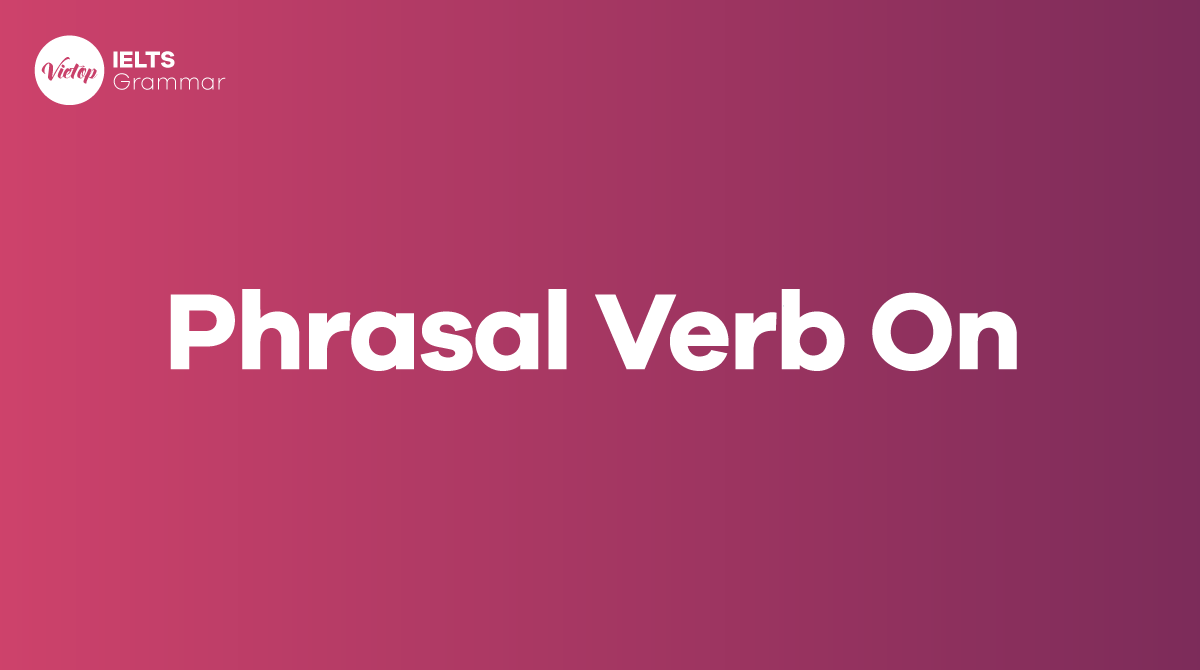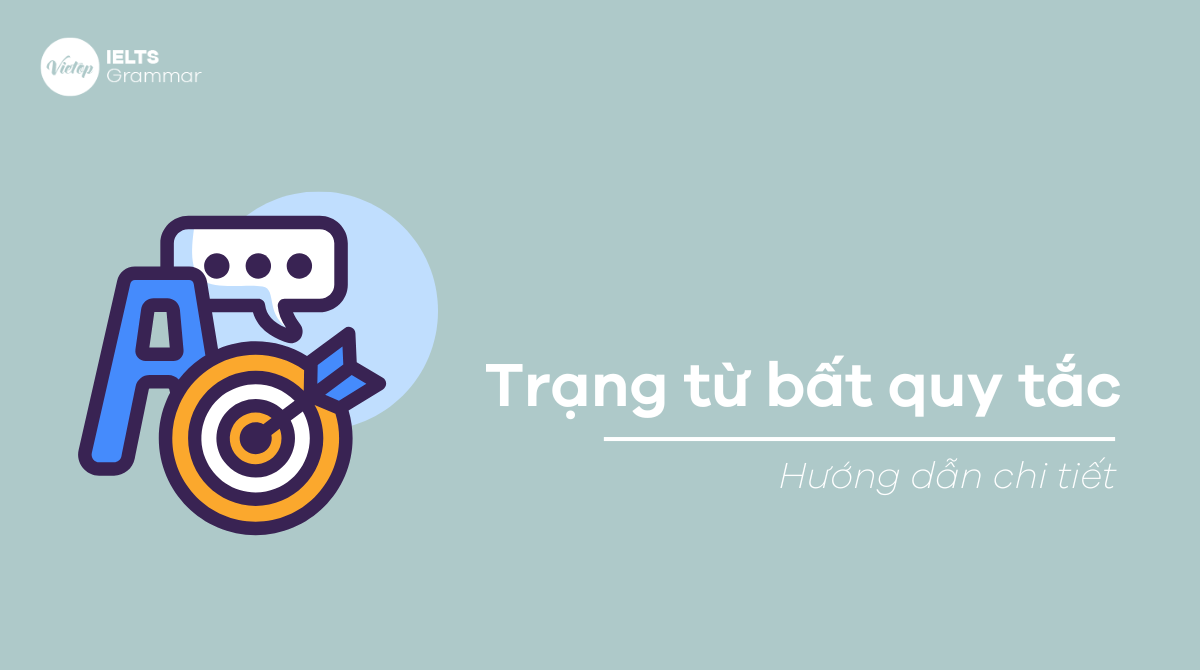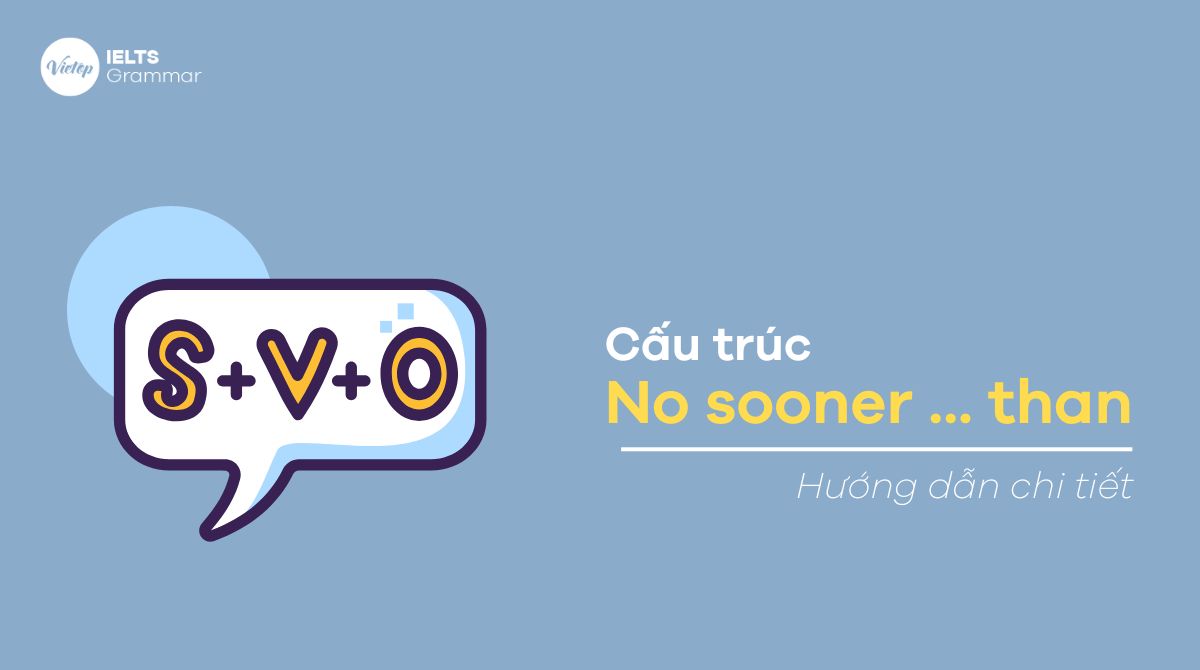Với bài viết dưới đây, mời các bạn cùng Vietop English tham khảo về Phrasal verb with On – cùng tìm hiểu các cụm động từ với On thông dụng trong tiếng Anh nhé. Đây là các cụm động từ tiếng Anh được người bản xứ sử dụng trong giao tiếp hằng ngày, các bạn cũng có thể ứng dụng chúng để đạt được điểm số cao hơn trong phần thi IELTS đấy!
Phrasal verbs là gì?
Phrasal verbs – cụm động từ là những động từ kết hợp với một hoặc nhiều giới từ hoặc phó từ để tạo thành một cụm từ có nghĩa mới. Khi kết hợp với giới từ hoặc phó từ, động từ sẽ thay đổi nghĩa hoàn toàn so với khi đứng một mình.
Việc sử dụng phrasal verbs là rất phổ biến trong tiếng Anh, đặc biệt trong giao tiếp hàng ngày. Phrasal verbs thường được sử dụng để mô tả hành động hoặc thể hiện ý nghĩa phức tạp hơn so với động từ đơn thuần.
Tổng hợp phrasal verb with on trong tiếng Anh

Get on
Phrasal verb get on rất thông dụng trong tiếng Anh, có thể có nhiều nghĩa khác nhau tùy vào ngữ cảnh sử dụng.
Get on (with someone/something): Hòa hợp với ai/cái gì
E.g.: I get on well with my coworkers.
Get on (a bus/train/plane): Lên xe buýt/tàu/phi cơ
E.g.: We need to hurry if we want to get on the train.
Get on (in age): Trở nên già đi
E.g.: My grandparents are getting on in age, so we try to visit them as often as we can.
Get on (with a task): Bắt đầu làm việc gì đó
E.g.: Let’s get on with our work so we can finish before the deadline.
Get on (someone’s nerves): Làm ai đó khó chịu, phát cáu
E.g.: His constant complaining is really getting on my nerves.
Get on (a horse/bike): Lên ngựa/xe đạp
E.g.: She loves to get on her horse and go for a ride in the countryside.
Get on (with life): Tiếp tục sống, vượt qua khó khăn
E.g.: After the breakup, she had to find a way to get on with her life.
Get on (with it): Bắt đầu hoặc tiếp tục làm việc gì đó một cách nhanh chóng
E.g.: We need to get on with it if we want to finish before the deadline.
Get on (board): Tham gia, gia nhập
E.g.: We’re excited to have you get on board with our new project.
Get on (someone’s good/bad side): Được ai đó yêu mến/hận thù
E.g.: If you want to get ahead in this company, you need to get on the boss’s good side.
Take on
Take on (a job/task): Nhận một công việc/nhiệm vụ mới
E.g.: She has decided to take on the job of managing the new project.
Take on (a challenge): Đối mặt với một thử thách
E.g.: The team is ready to take on the challenge of climbing the mountain.
Take on (a role/responsibility): Nhận một vai trò/trách nhiệm mới
E.g.: He has been asked to take on the role of team leader.
Take on (employees/workers): Tuyển dụng nhân viên/lao động mới
E.g.: The company is planning to take on more employees in the coming months.
Take on (a new persona): Thay đổi hoàn toàn cách cư xử
E.g.: When he’s on stage, he takes on a completely different persona.
Take on (a meaning): Có một ý nghĩa mới
E.g.: The word “cool” has taken on a different meaning in today’s society.
Take on (water/air): Tiếp nhận nước/khí
E.g.: The boat took on too much water and started to sink.
Take on (a competitor/opponent): Cạnh tranh với một đối thủ
E.g.: The company is looking to take on its competitors by introducing new and innovative products.
Take on (a new identity): Nhận một danh tính mới
E.g.: After the accident, she decided to take on a new identity and start a new life.
Take on (a client/customer): Nhận một khách hàng mới
E.g.: The company is always looking to take on new customers and expand its business.
Build on
Phrasal verb “build on” có nghĩa là phát triển hoặc mở rộng điều gì đó đã có sẵn hoặc đã được thực hiện trước đó. Dưới đây là một số ví dụ về cách sử dụng “build on”:
Build on (a foundation): Xây dựng trên nền móng đã có
E.g.: The new building will be built on the foundation of the old one.
Build on (success): Phát triển từ thành công trước đó
E.g.: The company is looking to build on the success of its last product launch.
Build on (experience): Phát triển từ kinh nghiệm trước đó
E.g.: The team is building on their experience from last season to improve their performance this year.
Build on (ideas): Phát triển từ ý tưởng đã có
E.g.: The project team is building on their initial ideas to develop a more comprehensive plan.
Build on (relationships): Phát triển từ mối quan hệ đã có
E.g.: The company is looking to build on its existing relationships with customers to expand its business.
Build on (strengths): Phát triển từ điểm mạnh đã có
E.g.: The athlete is working to build on her strength in order to improve her performance.
Build on (progress): Phát triển từ sự tiến bộ đã đạt được
E.g.: The team is building on the progress they have made so far to achieve their ultimate goal.
Build on (knowledge): Phát triển từ kiến thức đã có
E.g.: The researcher is building on her knowledge of the subject to develop new theories.
Build on (momentum): Phát triển từ đà tiến lên đã có
E.g.: The campaign is building on its momentum to reach even more people and raise more awareness.
Build on (a legacy): Phát triển từ di sản đã có
E.g.: The organisation is building on the legacy of its founder to continue its work and make a positive impact in the community.
Decide on
Phrasal verb “decide on” có nghĩa là quyết định chọn một sự lựa chọn hoặc hành động nào đó trong số nhiều lựa chọn có sẵn.
Decide on (a course of action): Quyết định hành động cụ thể
E.g.: After much consideration, we finally decided on a course of action to resolve the issue.
Decide on (a career path): Quyết định con đường nghề nghiệp
E.g.: It took her a while to decide on a career path, but she ultimately chose to become a teacher.
Decide on (a destination): Quyết định điểm đến
E.g.: We need to decide on a destination for our next vacation.
Decide on (a menu): Quyết định thực đơn
E.g.: The couple spent hours trying to decide on a menu for their wedding reception.
Decide on (a time): Quyết định thời gian
E.g.: We need to decide on a time for our meeting tomorrow.
Decide on (a purchase): Quyết định mua sắm
E.g.: After browsing through the store, she finally decided on a purchase.
Decide on (a name): Quyết định tên
E.g.: The couple is trying to decide on a name for their newborn baby.
Decide on (a plan): Quyết định kế hoạch
E.g.: The team is meeting to decide on a plan of action for the upcoming project.
Decide on (a strategy): Quyết định chiến lược
E.g.: The company is trying to decide on a strategy to improve its market position.
Decide on (an approach): Quyết định phương pháp tiếp cận
E.g.: The teacher is trying to decide on an approach to help her students improve their writing skills.
Xem thêm:
Hold on
Phrasal verb “hold on” có thể có nhiều nghĩa khác nhau tùy vào ngữ cảnh sử dụng. Đây là một số nghĩa phổ biến của “hold on” trong tiếng Anh:
Hold on (to something/someone): Giữ chặt cái gì đó/ai đó
E.g.: Hold on to the railing as you go up the stairs.
Hold on (for a moment): Chờ một chút
E.g.: Can you hold on for a moment while I finish this email?
Hold on (a phone call): Giữ điện thoại
E.g.: Please hold on a moment while I transfer your call to the right department.
Hold on (a belief/idea): Giữ vững niềm tin/ý tưởng
E.g.: Even in difficult times, it’s important to hold on to your beliefs and values.
Hold on (a handle): Nắm chặt tay cầm
E.g.: Hold on to the handlebars tightly while you ride the bike.
Hold on (to a job): Giữ chặt một công việc
E.g.: In this tough job market, many people are just trying to hold on to their current jobs.
Hold on (to hope): Giữ hy vọng
E.g.: Even when things seem hopeless, it’s important to hold on to hope and keep trying.
Hold on (to a relationship): Giữ chặt mối quan hệ
E.g.: Despite the challenges, they are determined to hold on to their relationship and make it work.
Hold on (to a memory): Giữ lại kỷ niệm
E.g.: She likes to hold on to her favourite memories by keeping photographs and mementoes.
Hold on (to a position): Giữ chặt một vị trí
E.g.: The company is trying to hold on to its position as a leader in the industry by investing in new technologies.
Go on
Go on (with something): Tiếp tục làm gì đó
E.g.: Let’s go on with the meeting and discuss the next agenda item.
Go on (about something): Nói về điều gì đó một cách dài dòng hoặc phiền phức
E.g.: He kept going on about his new car and how great it was.
Go on (a trip): Đi du lịch
E.g.: They are planning to go on a trip to Europe next summer.
Go on (a date): Đi hẹn hò
E.g.: She was nervous about going on a date with him for the first time.
Go on (a break): Nghỉ giải lao
E.g.: Let’s go on a break and grab a cup of coffee.
Go on (strike): Bãi công
E.g.: The workers decided to go on strike to demand better working conditions.
Go on (with life): Tiếp tục sống sau khi trải qua một trải nghiệm khó khăn
E.g.: After the loss of her husband, she had to find a way to go on with life.
Go on (a rant): Nói mãi về một chủ đề một cách tức giận hoặc phàn nàn
E.g.: He went on a rant about how unfair the system was.
Go on (stage): Lên sân khấu biểu diễn
E.g.: The band is getting ready to go on stage and perform their new song.
Go on (a diet): Bắt đầu ăn kiêng
E.g.: She decided to go on a diet and start eating healthier to lose weight.
Pick on
Phrasal verb “pick on” có nghĩa là đối xử độc ác hoặc bắt nạt ai đó, thường là những người yếu hơn hoặc không có khả năng tự bảo vệ trước kẻ bắt nạt. Dưới đây là một số ví dụ về cách sử dụng “pick on”:
Pick on (someone weaker): Bắt nạt ai đó yếu hơn
E.g.: The bully always picks on the smaller kids in the schoolyard.
Pick on (a flaw): Chỉ trích hoặc cố tình tìm lỗi sai
E.g.: She always picks on my grammar mistakes instead of focusing on the content of my writing.
Pick on (a detail): Chú ý đến chi tiết nhỏ mà không cần thiết
E.g.: The teacher kept picking on the students for not having their pencils sharpened.
Pick on (a theme): Tập trung vào một chủ đề hoặc ý tưởng
E.g.: The author tends to pick on the theme of love in her novels.
Pick on (a habit): Chỉ trích hoặc chê bai một thói quen của ai đó
E.g.: My mother always picks on my habit of biting my nails.
Pick on (a team): Đối xử bất công hoặc chỉ trích một đội thể thao
E.g.: The coach was accused of picking on certain players and favouring others on the team.
Pick on (a partner): Chỉ trích hoặc bắt nạt đối tác trong một mối quan hệ tình cảm
E.g.: The husband was always picking on his wife and criticizing everything she did.
Pick on (a subject): Chỉ trích hoặc cố tình tìm lỗi sai trong một chủ đề
E.g.: The journalist was accused of picking on the subject of immigration in her articles.
Pick on (a friend): Bắt nạt hoặc chỉ trích một người bạn
E.g.: He was upset when he found out that his friends were picking on him behind his back.
Pick on (a student): Đối xử bất công hoặc bắt nạt một học sinh
E.g.: The teacher was reprimanded for picking on a student with a learning disability and making fun of their mistakes in front of the class.
Try on
Phrasal verb “try on” có nghĩa là thử mặc hoặc thử đồ để xem nó vừa vặn hay không.
Try on (a dress): Thử mặc một chiếc váy
E.g.: She went to the store to try on a dress for her sister’s wedding.
Try on (a pair of shoes): Thử giày
E.g.: I always try on shoes before buying them to make sure they fit comfortably.
Try on (a piece of jewellery): Thử đồ trang sức
E.g.: She tried on a necklace to see how it looked with her outfit.
Try on (a hat): Thử mũ
E.g.: He tried on several hats before finding one that suited him.
Try on (a suit): Thử mặc bộ vest
E.g.: He needed to try on a suit for his job interview.
Try on (a pair of glasses): Thử kính mắt
E.g.: I went to the optometrist to try on a pair of glasses and get my prescription updated.
Try on (a jacket): Thử mặc áo khoác
E.g.: She tried on a jacket to see if it would keep her warm enough in the winter weather.
Try on (a pair of pants): Thử mặc quần
E.g.: He had to try on several pairs of pants before finding the right size and fit for his body type.
Work on
Phrasal verb “work on” có nghĩa là làm việc để cải thiện, phát triển hoặc giải quyết một vấn đề nào đó.
Work on (a project): Làm việc để hoàn thành một dự án
E.g.: We need to work on the project to make sure it’s ready for the deadline.
Work on (a skill): Làm việc để phát triển kỹ năng
E.g.: She’s been working on her public speaking skills so that she can give better presentations.
Work on (a relationship): Làm việc để cải thiện mối quan hệ
E.g.: They’re seeing a couples therapist to work on their relationship and communication issues.
Work on (a problem): Làm việc để giải quyết một vấn đề
E.g.: The team needs to work on the problem and come up with a solution quickly.
Work on (a manuscript): Làm việc để hoàn thiện một bản thảo
E.g.: The author has been working on her manuscript for months, revising and editing it to make it the best it can be.
Work on (a proposal): Làm việc để chuẩn bị một đề xuất
E.g.: The company is working on a proposal to present to investors to secure funding for their new product.
Work on (a budget): Làm việc để quản lý ngân sách
E.g.: They need to work on their budget to make sure they’re not overspending on unnecessary expenses.
Work on (a health issue): Làm việc để cải thiện sức khỏe
E.g.: He’s been working on his fitness and diet to improve his health and well-being.
Work on (a performance): Làm việc để chuẩn bị một buổi biểu diễn
E.g.: The band has been working on their performance, rehearsing and practising to make sure it’s perfect.
Work on (a task): Làm việc để hoàn thành một nhiệm vụ
E.g.: He’s been working on the task all day, trying to get it finished before the deadline.
Xem thêm:
Các Phrasal verb with On khác
Dưới đây là một số phrasal verbs khác với “on” cùng với nghĩa và ví dụ minh họa:
Call on (someone): Yêu cầu hoặc mời ai đó làm gì đó
E.g.: The teacher called on the student to answer the question.
Count on (someone/something): Tin tưởng hoặc dựa vào ai đó/cái gì đó
E.g.: I know I can count on my best friend to be there for me when I need her.
Carry on (with something): Tiếp tục làm gì đó
E.g.: Despite the challenges, we need to carry on with our plans and not give up.
Come on: Khuyên ai đó làm gì đó hoặc thể hiện sự thất vọng
E.g.: Come on, let’s go to the movies tonight!
Depend on (someone/something): Phụ thuộc vào ai đó/cái gì đó
E.g.: The success of this project depends on everyone’s contribution and effort.
Get on (with someone): Có mối quan hệ tốt với ai đó
E.g.: I really get on well with my new coworkers at the office.
Look on: Nhìn vào hoặc xem một cách khách quan
E.g.: You need to look on the bright side and focus on the good things in life.
Put on (clothing): Mặc quần áo hoặc đồng phục
E.g.: He put on his suit and tie for the important meeting.
Settle on: Quyết định chọn một lựa chọn cuối cùng
E.g.: After considering all the options, we finally settled on the best course of action.
Bài tập phrasal verb with On
Bài 1: Choose the correct phrasal verb to complete the sentence
1. The company needs to __________ a new marketing strategy to attract more customers.
- a. work on
- b. get on
- c. put on
- d. depend on
2. I can always __________ my sister to help me with my homework.
- a. call on
- b. depend on
- c. carry on
- d. look on
3. The concert was about to start, so the band __________ on stage.
- a. picked on
- b. went on
- c. set on
- d. come on
4. I need to __________ a jacket to see if it fits me properly.
- a. call on
- b. try on
- c. depend on
- d. work on
5. The team needs to __________ a solution to the problem before the deadline.
- a. go on
- b. depend on
- c. come on
- d. work on
6. I always __________ my friends for support during difficult times.
- a. look on
- b. call on
- c. work on
- d. depend on
7. The company __________ a new product that will be released next month.
- a. put on
- b. depend on
- c. work on
- d. go on
8. I can’t __________ this cold weather anymore. I’m ready for spring.
- a. carry on
- b. depend on
- c.get on
- d. look on
9. The team needs to __________ their performance before the big game.
- a. carry on
- b. work on
- c. put on
- d. depend on
10. I can always __________ my mom to make me feel better when I’m upset.
- a. call on
- b. depend on
- c. carry on
- d. look on
Bài 2: Fill in the blank with the correct phrasal verb
- The students need to __________ their grammar skills to improve their writing.
- Can you __________ this package for me while I grab my keys?
- She was feeling down, so I tried to __________ her by telling her a joke.
- The team needs to __________ a new strategy if they want to win the game.
- I always __________ my dad to give me advice when I’m making a big decision.
- The company is planning to __________ a new office in the city.
- The teacher __________ the student for not doing their homework.
- I need to __________ a new outfit for the party this weekend.
- The couple is seeing a therapist to __________ their relationship.
- The band __________ playing their new song at the concert last night.
Đáp án
Bài 1
- a. Work on
- a. Call on
- b. Went on
- b. Try on
- d. Work on
- b. Call on
- c. Work on
- c. Get on
- b. Work on
- a. Call on
Bài 2
- Work on
- Hold on
- Cheer on
- Come up with
- Depend on
- Put on
- Picked on
- Try on
- Work on
- Went on
Trên đây là bài viết Phrasal verb with On – Cùng tìm hiểu các cụm động từ với On thông dụng trong tiếng Anh, hy vọng các bạn đã tham khảo thêm được những phrasal verbs hay để áp dụng vào tiếng Anh giao tiếp hằng ngày cũng như trong kỳ thi IELTS. Vietop chúc các bạn học tốt và hẹn các bạn ở những bài viết sau nhé!






![[Mới nhất] Cập nhật bảng tổng hợp quy đổi điểm IELTS sang điểm xét tuyển đại học khu vực phía Nam 2025](https://vietop.edu.vn/wp-content/uploads/2025/12/thumbnail-cap-nhat-bang-quy-doi-diem-ielts.jpg)


